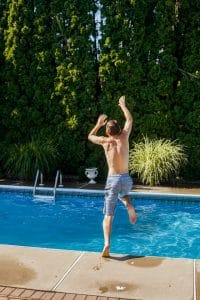Now that we’re entering what is traditionally the hottest time of the year in Pennsylvania, many are seeking out water activities to cool off. It’s a great way to beat the heat and humidity, but if you aren’t careful, water can get into your ears and become trapped, causing an infection. Left untreated, you might even experience temporary hearing loss. Needless to say, it’s important to remove as much water as possible from your ears in order to avoid complications such as these.
Tried and True Techniques for Removing Trapped Water

West Chester residents looking for ways to cool off during the dog days of summer often seek out bodies of water. Landlocked Pennsylvania might not have the best surfing conditions, but there are plenty of rivers and lakes in which to swim around. One of them is pretty Great. Regardless of where you dip your toes, water can cause problems when it gets inside your ears.
Signs of water in your ear canals include sounds that appear muffled and a plugged-up feeling in the ears. You might also experience ear pain, loss of balance and coordination, ringing in the ears, runny nose and sore throat. Unless properly removed, trapped water can lead to swimmer’s ear, surfer’s ear and other conditions that may cause a painful infection and side effects that include hearing loss.
We’re betting that doesn’t sound very fun to you! To prevent water from remaining in your ears after a swim or shower (or romp in the kiddie pool), try the following techniques.
- The Gravity/Jiggling Technique. Gravity is a wonderful thing; you can harness its power by lying on the ground with your ear facing the floor; tilting your head and jiggling your earlobe should free any trapped water. A cotton swab can help speed up the process.
- The Valsalva Maneuver. Scuba divers and airline travelers are familiar with this trick. Close your mouth, plug your nose and blow it using modest pressure. This should help equalize the pressure in your ears.
- The Vacuum Technique. No need to bust out the Hoover; simply place your palm over the plugged-up ear and press down softly for a few seconds. This will create a suction effect that will help loosen and drain trapped water.
- The Hairdryer Technique. You can use a hairdryer to help dry out water trapped in your ear. Turn it onto the low heat setting and aim it at your ear from a safe distance. Even if you don’t get it all, the rest should drain within a few minutes.
- The Pulling Technique. Pull back on the outer portion (concha) of your ear by reaching around behind your head and giving it a tug. This straightens out the ear canal so that trapped water has an easy drainage path.
- The Chew and Yawn Technique. Chewing gum and yawning are often effective ways to remove water from your ears. Movement of the mouth relieves pressure in the Eustachian tubes, freeing trapped water. Try shaking your head afterward if you still feel water in there.
- The Chemical Technique. If these tricks don’t work, there are always over-the-counter ear drops designed to remove moisture from your canals. Look for alcohol-based products for best results.
Of course, if water never gets into your ears in the first place, you won’t need any of these handy tips. Going swimming? Your audiologist in Pennsylvania recommends wearing swim plugs or a swim cap. Always dry your ears thoroughly after exposing them to water. If you are plagued by ear pain or pressure after you’ve spent time in the water and are unable to get it to drain with the above techniques, schedule an appointment with an ear, nose and throat doctor in Pennsylvania.